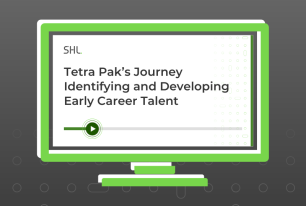How to Make Your Graduate Recruitment Experience Stand Out from the Crowd
Changing expectations and needs means that creating a meaningful and engaging graduate recruitment process is not that simple. Learn what you can do to bring your hiring strategy to the next level.
Share
Job vacancies are increasing across Europe. In the U.K. alone, they have reached a record high since 2001 with 1 million vacancies being advertised.
This is good news for Gen Z, whom some may argue have been most impacted by the pandemic. By 2025, this cohort will make up about 27% of the global workforce. With a recent Adobe Survey of 5,500 people reporting that 56% of this group are considering resigning, now is the time to re-think your graduate recruitment strategy—how to attract, recruit, and retain graduates and those entering into early careers in your organization.
The backdrop
Recent graduates and those entering the workforce for the first time have been dealt a particularly challenging hand in the past 18 months. Due to long periods of unemployment or fully remote working post-graduation, Gen Z has missed out on gaining valuable work experiences and training. However, being the first fully global and digital generation, they bring unique knowledge and skills and show key behavioral strengths in domains such as digital collaboration, creativity, and analytical ability. (GTI & SHL UGOTY 2021 results).
What do our young employees want from an employer?
There is a plethora of research available on how Covid-19 has impacted not only when and where we physically work, but also on how it has resulted in a significant shift in employees’ attitudes towards work. In particular, our younger employees recognize and value diversity in the truest sense and the importance of bringing your whole and unique self at work. They value human connection, for their ideas to be heard, and to work for an organization that has a clear purpose, giving back to the community in some way.
In uncertain times, the underlying values and assumptions of many organizations shift from exploration and creativity to safety and resilience (Kniffen et al 2020). For example, a recent survey of 145,000 workers worldwide by Leesman, which measured employee experience, found that 28% of home workers said they were unable to collaborate on creative work while at home. New employees are particularly likely to be impacted by the barriers of remote working. A recent survey of graduates reported in the Financial Times last July outlined a range of stories from recent graduates who have struggled to engage with their co-workers and make an impact in a virtual environment. Some spoke about how they felt they ‘could not get a word in edgeways at meetings’, were ‘struggling to manage work/home boundaries’, and were ‘just an email’ address to their employer. The opportunity to build social networks, co-create, learn, and connect to company culture has been missed acutely by this generation.
What is the answer?
The answer to attracting this generation of employees to our workplaces may at first appear to be the promise of a face-to-face work environment. But it is not so simple. A broad-brush approach will not work for a generation that value a personalized approach to their unique needs and circumstances. Indeed a recent study by Bright Network reports that whilst 94% of graduates want to be in the office at least some of the time, most do want some form of flexibility. Successful organizations are recognizing and anticipating this shift in attitudes, values, and behaviors, and investing in creating an enhanced and more seamless experience across the employee lifecycle. Infusing each stage of the cycle from attraction through to onboarding and development with a purposeful and personalized experience with human connection at its core is key to engagement and ultimately organizational success in the future.
Gen Z has missed out on gaining valuable work experiences and training. The opportunity to build social networks, co-create, learn and connect to company culture has been missed acutely by this generation.
What first steps can I take?
- Invest in your attraction and assessment experience – To attract, connect with and engage this generation, consider how you can infuse these experiences with your organization's purpose, culture, values, and people. Having personally supported a wide range of clients over the years with the design and delivery of graduate and early careers assessment processes, one thing has not changed: people buy from people they trust. Candidates make decisions about whether they would like to work at an organization based on the people they meet, the stories they tell about the purpose, culture, values, and ways of working at the company. This is backed up by recent research by Bright Networks of 15,000 students and recent graduates, with 40% saying that people and culture were most important to them when choosing a role. Consider how you can connect your employees with candidates at the earliest stage possible, how you can help them understand your unique culture, values, and purpose, the types of situations they are likely to encounter in the role, etc. With the wide range of new technology available, it has become possible to reach a much wider range of diverse candidates—a capability that you need to capitalize on.
- Invest in your employee’s experience of culture – With the shift to remote and hybrid working, questions are rightly being asked about the impact this will continue to have on company culture. The physical distance of people from the traditional workplace, colleagues, and associated rituals of water cooler conversations, tea break chats, etc. has also eroded employees’ emotional connection to organizations. That ‘sense of belonging’ has not really developed for those whose only experience of the workplace has been virtual. As we move to the next phase of a ‘hybrid’ workforce, it will be important for organizations to really invest in reinvigorating their organizational culture. This will not be an easy task. How do we build a culture that equally translates for those who choose to work at home or in the office? How do we prevent cliques from forming and equal opportunity for all? How do we create a culture where people feel valued, psychologically safe, and can be their true self… where they feel they belong? Culture is not built overnight. It is a continuous journey with many iterations along the way. Perhaps a job title we will see more commonly soon will be ‘Chief Culture Officer’.
- Invest in personalized Learning and Development Experiences – In line with the anecdotal stories, we hear from students and graduates, as well broader global research, SHL’s data confirms that while our graduates bring some key strengths to our organizations, they like all of us need support in some areas. The first 12-18 months in an entry-level role is pivotal. During this time, new employees learn key skills such as how to build relationships in a work environment, commercial awareness, resilience, presentation skills, etc.—all of which pave the way to acquire business-critical skills, as well as the confidence to bring their views and ideas to the table. Brightwaves study mentioned above reports that 95% of respondents want to be upskilled directly by employers, with coding and commercial awareness being the skills they want to work on most. Concerns have been raised by many business leaders about the impact that the ‘gap’ in such skill development will have not just now but also on longer-term career trajectories. Personalized, on-the-job support and mentoring have never been more critical for any group of new employees to help fill this potential gap. The key here will be using available, objective assessment data to help employees understand where they excel and where they may need more support to onboard and develop the future skills they need to be successful.
Infusing each stage of the cycle from attraction through to onboarding and development with a purposeful and personalized experience with human connection at its core is key to engagement and ultimately organizational success in the future.
Where to next?
The past year has been like no other for employers and their employees, with our younger generations of workers being most acutely impacted in a range of ways. This generation of young workers needs structure, learning and development opportunities and support like no other generation has needed to get their careers off the ground and/or back on track.
Let SHL help you to create a meaningful recruitment experience for your potential graduates and early careers candidates. Our solution allows deep insight into employer culture and tangible value for every candidate. It does this by transforming your hiring program into a powerful, meaningful journey packed with outstanding personalized experiences, virtual tools, and unrivaled science that aligns them to the challenges your business faces today.
Get the most out of your graduate hiring program. Read the latest reports to better understand your early career talent cohorts.
Contact us to learn more about how we can support you and schedule a demo.









